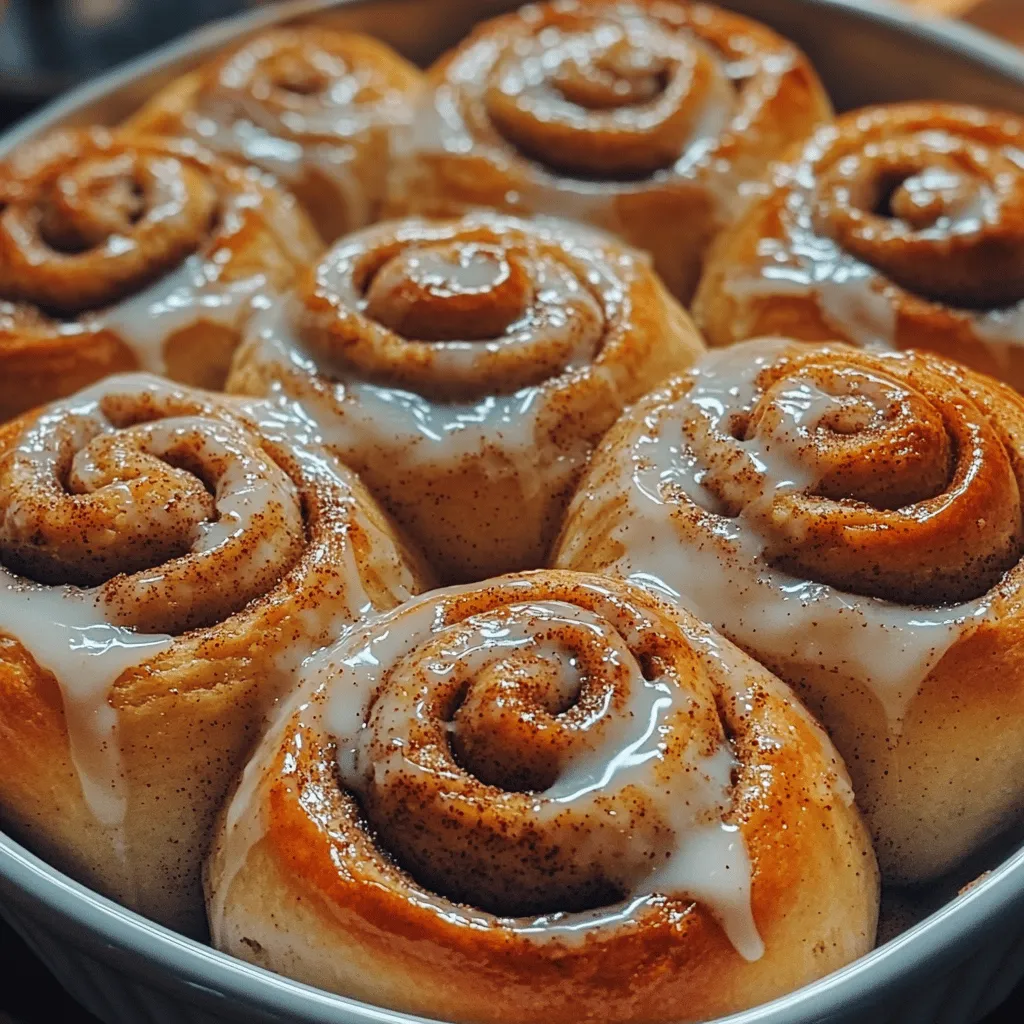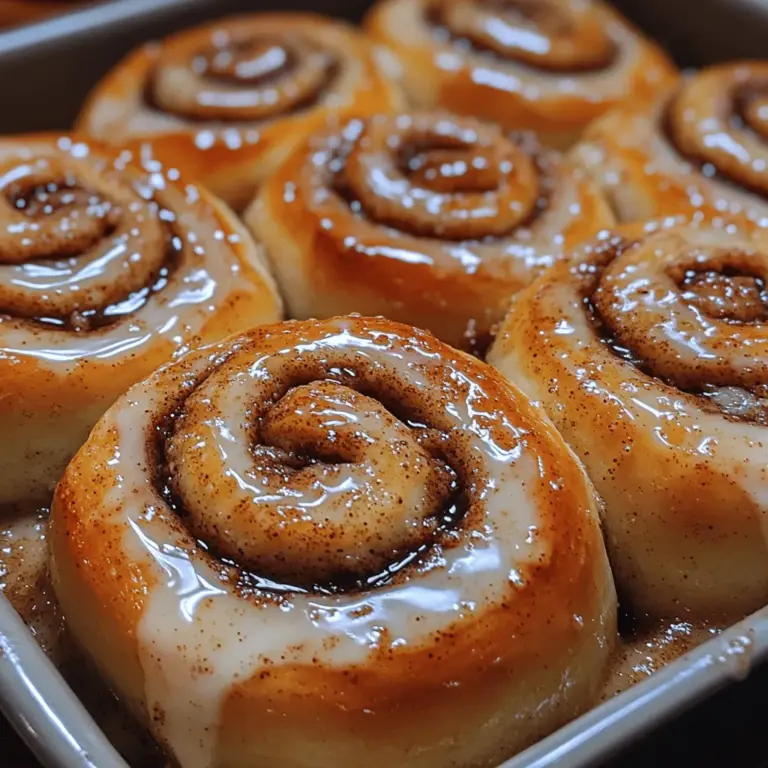Introduction
There’s something irresistibly cozy about the smell of freshly baked cinnamon rolls wafting through your home. With their soft, pillowy texture and the warm infusion of aromatic spices, cinnamon cardamom rolls have captured the hearts and taste buds of many around the globe. These delightful pastries combine the sweet warmth of cinnamon with the unique floral notes of cardamom, creating an indulgent treat that is perfect for breakfast, brunch, or dessert.
Cinnamon rolls have a rich history, appearing in various forms across different cultures. From the classic American cinnamon roll topped with a creamy glaze to the Scandinavian kanelbullar—often adorned with sugar and cardamom—these rolls represent a beloved tradition of baking that transcends borders. The combination of cinnamon and cardamom not only adds depth to the flavor profile but also evokes a sense of nostalgia, reminding us of family gatherings and the comfort of home.
While this recipe is inherently indulgent, it can be tailored to meet various dietary considerations. For those seeking a vegan option, substitute dairy with plant-based alternatives and use a vegan butter alternative. Gluten-free flour can also be used for a gluten-free version, making these rolls accessible to a broader audience. Regardless of dietary preferences, the appeal of cinnamon cardamom rolls remains universal, inviting everyone to partake in their deliciousness.
—
Understanding the Ingredients
To create the perfect aromatic cinnamon cardamom rolls, it’s essential to understand the role of each ingredient in the recipe. High-quality, fresh ingredients are the key to elevating your baking and ensuring that every bite is flavorful and satisfying.
Essential Ingredients
1. Flour: The foundation of any baked good, flour provides structure to the rolls. All-purpose flour is commonly used, but for a softer texture, bread flour can also be an excellent choice due to its higher protein content.
2. Yeast: This essential ingredient is responsible for the rise in the rolls. Instant yeast or active dry yeast can be used, ensuring that the rolls achieve a fluffy, light texture. Yeast also contributes subtly to the flavor.
3. Sugar: Not only does sugar sweeten the rolls, but it also aids in the browning process during baking, resulting in a beautiful golden crust. Brown sugar can be used in the filling for added richness.
4. Milk: Dairy milk or plant-based milk provides moisture and richness to the dough. It also helps to activate the yeast, leading to a better rise.
5. Butter: Softened butter enriches the dough, making it tender and flavorful. For a dairy-free option, use a non-dairy butter or coconut oil.
6. Eggs: Eggs add moisture and richness to the dough while also helping it to rise. They provide structure, contributing to the rolls’ overall texture.
7. Cinnamon and Cardamom: The star spices of this recipe. Ground cinnamon offers warmth and sweetness, while cardamom adds a distinct floral note that complements the cinnamon beautifully. Freshly ground spices tend to have a more potent flavor, so whenever possible, opt for whole spices and grind them at home.
8. Salt: A crucial element in baking, salt enhances the flavors of the other ingredients and helps to control yeast activity.
Fresh Produce and Their Role
While cinnamon and cardamom are the primary flavors, fresh produce can also play a role in elevating the overall taste. For instance, using freshly grated nutmeg or zest from citrus fruits like oranges can add an interesting twist to the flavor profile. The freshness of the ingredients directly correlates to the flavor intensity, making it worth sourcing high-quality spices and fresh produce for your rolls.
Proteins Used and Their Nutritional Benefits
In this particular recipe, proteins are not the main focus, as the rolls are primarily a carbohydrate-rich treat. However, the inclusion of eggs does contribute some protein, enhancing the nutritional profile of the rolls. Eggs are also a source of essential vitamins and minerals, providing benefits such as improved eye health and increased satiety.
Spices and Herbs That Enhance Flavor
The combination of cinnamon and cardamom is what truly sets these rolls apart. Cinnamon is well-known for its antioxidant properties and its ability to regulate blood sugar levels. Cardamom, often referred to as the “queen of spices,” has been used in traditional medicine for its anti-inflammatory and digestive benefits. Together, they provide not only flavor but also a touch of healthfulness to your indulgent treat.
Importance of Ingredient Quality
When it comes to baking, the quality of ingredients cannot be overstated. Opting for fresh, high-quality ingredients will yield a more flavorful and enjoyable end product. For instance, using fresh spices instead of pre-ground ones can significantly elevate the taste of your cinnamon cardamom rolls. Likewise, choosing organic flour and dairy products can enhance both flavor and nutrition, making your baking experience even more satisfying.
—
Preparation Techniques
Before diving into the cooking process, it’s crucial to prepare your ingredients properly. This step ensures that everything is ready for a smooth baking experience and enhances the final result.
Step-by-Step Guide to Preparing Ingredients
1. Measuring Flour: Use a kitchen scale for precise measurement if possible. If using cups, spoon the flour into the measuring cup without packing it down, and level it off with a knife.
2. Activating Yeast: If using active dry yeast, dissolve it in warm milk (about 110°F) with a pinch of sugar and let it sit for about 5-10 minutes until foamy. For instant yeast, you can mix it directly with the dry ingredients.
3. Softening Butter: Allow the butter to come to room temperature for easier incorporation into the dough. If you’re short on time, you can soften it in the microwave using short bursts of heat.
4. Preparing the Filling: In a bowl, mix together brown sugar, cinnamon, and cardamom for the filling. Ensure the spices are well-combined for even flavor distribution.
5. Chopping Nuts (if using): If you choose to add nuts like walnuts or pecans for added texture, chop them coarsely to avoid overpowering the roll with large pieces.
Cleaning and Cutting Vegetables
While there are no vegetables in this recipe, if you were to create a savory version of cardamom rolls, you might consider incorporating veggies. For instance, cleaning and chopping fresh herbs or vegetables would involve rinsing them under cold water, drying them with a paper towel, and then chopping them into appropriate sizes for your filling.
Marinating Proteins for Enhanced Flavor
In this sweet recipe, marinating isn’t applicable. However, if you were to explore savory variations, marinating proteins in yogurt, spices, and herbs would enhance their flavor profile, allowing for deeper seasoning.
Cooking Methods Explained
This recipe primarily involves baking. Here’s a brief overview of techniques relevant to the process:
1. Baking: Preheat your oven to the specified temperature—usually around 350°F for cinnamon rolls. Baking allows the rolls to rise properly and ensures an even cook throughout.
2. Sautéing (if applicable): In a savory variation, sautéing garlic or onions before incorporating them into the filling would enhance their sweetness and flavor.
3. Proofing: This step involves allowing the dough to rise after kneading. It’s essential for developing the rolls’ texture. Aim for a warm, draft-free area, and cover the dough with a clean kitchen towel to retain moisture.
Tips for Achieving the Perfect Texture
– Kneading: Knead the dough until it is smooth and elastic, usually about 8-10 minutes. This develops the gluten, contributing to the rolls’ chewy texture.
– Resting: Allowing the dough to rest is crucial. If it feels too elastic when rolling out, let it rest for 5-10 minutes to relax the gluten.
– Proofing: For optimal rise, let the dough proof in a warm environment. A common trick is to place the dough in a slightly warmed oven (turned off) or near a warm stove.
—
The Cooking Process
Now that your ingredients are prepared, let’s walk through the detailed process of making aromatic cinnamon cardamom rolls, ensuring every step is executed perfectly for the best results.
Detailed Walkthrough of the Recipe
1. Mixing the Dough: Begin by combining the flour, sugar, salt, and yeast in a large mixing bowl. Create a well in the center and add warm milk, softened butter, and eggs. Mix until the dough starts to come together.
2. Kneading: Transfer the dough to a floured surface and knead it for about 8-10 minutes until smooth and elastic. If the dough is too sticky, add a little flour at a time, but be careful not to over-flour.
3. First Proofing: Place the kneaded dough in a greased bowl, cover it with a kitchen towel, and let it rise in a warm spot for about 1-2 hours, or until it has doubled in size.
4. Rolling Out: Once the dough has risen, punch it down to release the air. Transfer it to a floured surface and roll it out into a rectangle approximately 1/4 inch thick.
5. Adding the Filling: Spread the softened butter over the rolled-out dough, ensuring even coverage. Sprinkle the cinnamon-cardamom sugar mixture evenly on top, followed by any chopped nuts if desired.
6. Rolling the Dough: Starting from one long side, carefully roll the dough into a tight log. Use a sharp knife or pastry cutter to slice the log into even rolls, typically about 1-2 inches thick.
7. Second Proofing: Place the rolls in a greased baking dish, ensuring they are close but not touching. Cover with a kitchen towel and let them rise again for about 30-45 minutes until puffy.
8. Baking: Preheat your oven to 350°F. Bake the rolls for 20-25 minutes or until golden brown and cooked through. Keep an eye on them to prevent over-baking.
Combining Ingredients: Order and Timing
The order in which ingredients are combined is crucial for achieving the desired texture and flavor. Mixing dry ingredients first ensures that the yeast is evenly distributed, while adding wet ingredients afterward allows for better incorporation. Timing also plays a significant role in the baking process; following specified rise times ensures that the yeast works effectively, providing a light and fluffy texture.
Cooking Times and Temperatures for Optimal Results
Baking times can vary based on your oven and the size of the rolls. Generally, a temperature of 350°F is perfect for baking cinnamon rolls, allowing them to cook through without burning. Check for doneness by looking for a golden-brown color and a slight spring back when gently pressed.
Signs That Each Component is Cooked to Perfection
– Dough: The dough should be doubled in size after proofing, and when baked, it should be golden brown with a slight crust.
– Filling: The sugar mixture should melt slightly into the dough during baking, creating a sweet, gooey center.
– Texture: Cut a roll in half to check the interior; it should be soft and pillowy, without any raw dough.
By understanding these fundamental steps and preparation techniques, you’ll be well on your way to creating delicious, aromatic cinnamon cardamom rolls that are sure to impress. Stay tuned for the next part, where we will delve into the finishing touches and how to serve these delightful treats.


